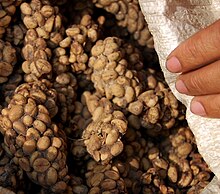 | |
| Alternative names | Indonesian pronunciation: [ˈkopi ˈlu.aʔ] |
|---|---|
| Place of origin | Indonesia[1] |
| Main ingredients | Coffea arabica |
Kopi luwak, also known as civet coffee, is a coffee that consists of partially digested coffee cherries, which have been eaten and defecated by the Asian palm civet (Paradoxurus hermaphroditus). The cherries are fermented as they pass through a civet's intestines, and after being defecated with other fecal matter, they are collected.[1] Asian palm civets are increasingly caught in the wild and traded for this purpose.[2]
Kopi luwak is produced mainly on the Indonesian islands of Sumatra, Java, Bali, Sulawesi, and in East Timor. It is also widely gathered in the forest or produced in farms in the islands of the Philippines,[3] where the product is called kape motit in the Cordillera region, kapé alamíd in Tagalog areas, kapé melô or kapé musang in Mindanao, and kahawa kubing in the Sulu Archipelago.

Kopi luwak is also produced in Palawan's Langogan Valley. The beans from droppings of the Asian palm civet and Palawan binturong (Arctictis binturong whitei) are collected from the forest floor and cleaned.[4][5]
Producers of the coffee beans argue that the process may improve coffee through two mechanisms: selection, where civets choose to eat only certain cherries; and digestion, where biological or chemical mechanisms in the animals' digestive tracts alter the composition of the coffee cherries.
The traditional method of collecting feces from wild Asian palm civets has given way to an intensive farming method, in which the palm civets are kept in battery cages and are force-fed the cherries. This method of production has raised ethical concerns about the treatment of civets and the conditions they are made to live in, which include isolation, poor diet, small cages, and a high mortality rate.[6][7][8]
Although kopi luwak is a form of processing rather than a variety of coffee, it has been called one of the most expensive coffees in the world, with retail prices reaching US$100 per kilogram for farmed beans and US$1,300 per kilogram for wild-collected beans.[9] Another epithet given to it is that it is the "Holy Grail of coffees."[10]
- ^ a b Mahendradatta, M.; Tawali, A. B. (2012). Comparison of chemical characteristics and sensory value between luwak coffee and original coffee from China (Coffea arabica L) and Robusta (Coffea canephora L) varieties (PDF). Makassar: Food Science and Technology Study Program, Department of Agricultural Technology, Faculty of Agriculture, Hasanuddin University. Archived from the original (PDF) on 17 October 2013. Retrieved 21 August 2019.
- ^ Shepherd, C. (2012). "Observations of small carnivores in Jakarta wildlife markets, Indonesia, with notes on trade in Javan Ferret Badger Melogale orientalis and on the increasing demand for Common Palm Civet Paradoxurus hermaphroditus for civet coffee production". Small Carnivore Conservation. 47: 38–41. S2CID 129958721.
- ^ Ongo, E.; Montevecchi, G.; Antonelli, A. (2020). "Metabolomics fingerprint of Philippine coffee by SPME-GC-MS for geographical and varietal classification". Food Research International. 134: 109227. doi:10.1016/j.foodres.2020.109227. hdl:11380/1200548. PMID 32517906. S2CID 216380024.
- ^ Graham, D. (2023). "What is civet coffee? Discover the drink that passes through the gut of a South-East Asian mammal". BBC Lifestyle. Archived from the original on 18 May 2024. Retrieved 17 May 2024.
- ^ Enriquez, M. (2017). "Puerto Princesa: Best 'ube hopia,' civet organic coffee, fireflies tour". Philippine Daily Inquirer. Archived from the original on 18 May 2024. Retrieved 17 May 2024.
- ^ Milman, O. (2012). "World's most expensive coffee tainted by 'horrific' civet abuse". The Guardian. Archived from the original on 4 June 2017. Retrieved 25 November 2012.
- ^ Penha, J. (2012). "Excreted by imprisoned civets, kopi luwak no longer a personal favorite". The Jakarta Globe. Archived from the original on 16 January 2013. Retrieved 17 August 2012.
- ^ Lynn, G.; Rogers, C. (2013). "Civet cat coffee's animal cruelty secrets". BBC News. Archived from the original on 29 April 2018. Retrieved 16 September 2013.
- ^ "What Is the Price of Kopi Luwak? (Full Breakdown for 2021-22)". Eleven Coffees. 2020. Archived from the original on 10 May 2021. Retrieved 27 October 2020.
- ^ "Cat poop coffee goes biotech". Nature Biotechnology. 33 (10): 1014. 2015. doi:10.1038/nbt1015-1014c. PMID 26448073. S2CID 205271988.